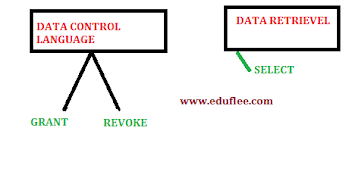Statements in Oracle DCL
Statements in Oracle DCL is one of the subset in Oracle, DCL is Data Control Language, which is mainly used to get and give access to the other users.
In the previous session, that we have discussed about the DML (Data Manipulation Language), DDL (Data Define Language), to access those this DCL command is required. In other words we can say giving authorization to the objects and data which are stored in the database.
List of Commands of DCL
GRANT => Grant is used to giving permission or privileges to other schema.
REVOKE => Revoking (removing) the permission that was given to any user or schema.
Syntax for DCL
GRANT
GRANT privileges ON Objects to schema;
For example:
privileges : SELECT, UPDATE, DELETE, INSERT
objects are : Table, view, Materialized views etc.
------ Updating permission in orders table for devuser2 schema.
GRANT UPDATE ON orders TO devuser2;
This grant permission is mainly used by the admin to give access only for the particular users.
REVOKE
REVOKE privileges ON objects to Schema;
----- Removing the privileges or access to the devuser2 schema
REVOKE UPDATE ON orders TO devuser2;
In order to remove or revoke the permission this Revoke command is used.
What are the types of Privileges are there in Oracle ?
Types of privileges that are used in Oracle are:
- System Privileges
- Object Privileges.
In system Privileges is used to control the access while creating any database objects and other admin related activities.
In object privileges is used to control the access while creating or changing any database objects by using various commands like Alter, Delete, Drop etc..,
Statements in Oracle Data Retrieval
Oracle Data Retrieval is one of the subset of Oracle statements.
- SELECT
SELECT command is used to retrieve a data.
SELECT * FROM orders;
Selecting the records from the orders table.
CONCLUSION
I hope you can able to understand this two subset of oracle sql, which is data control language and data retrieval.
In the Interview part, this won't be much more important.
So, if you having any doubts in this article means kindly feel free to reach out us through contact form or official mail.

Add this privilages, unlock the user privilage if it is locked means
ReplyDelete